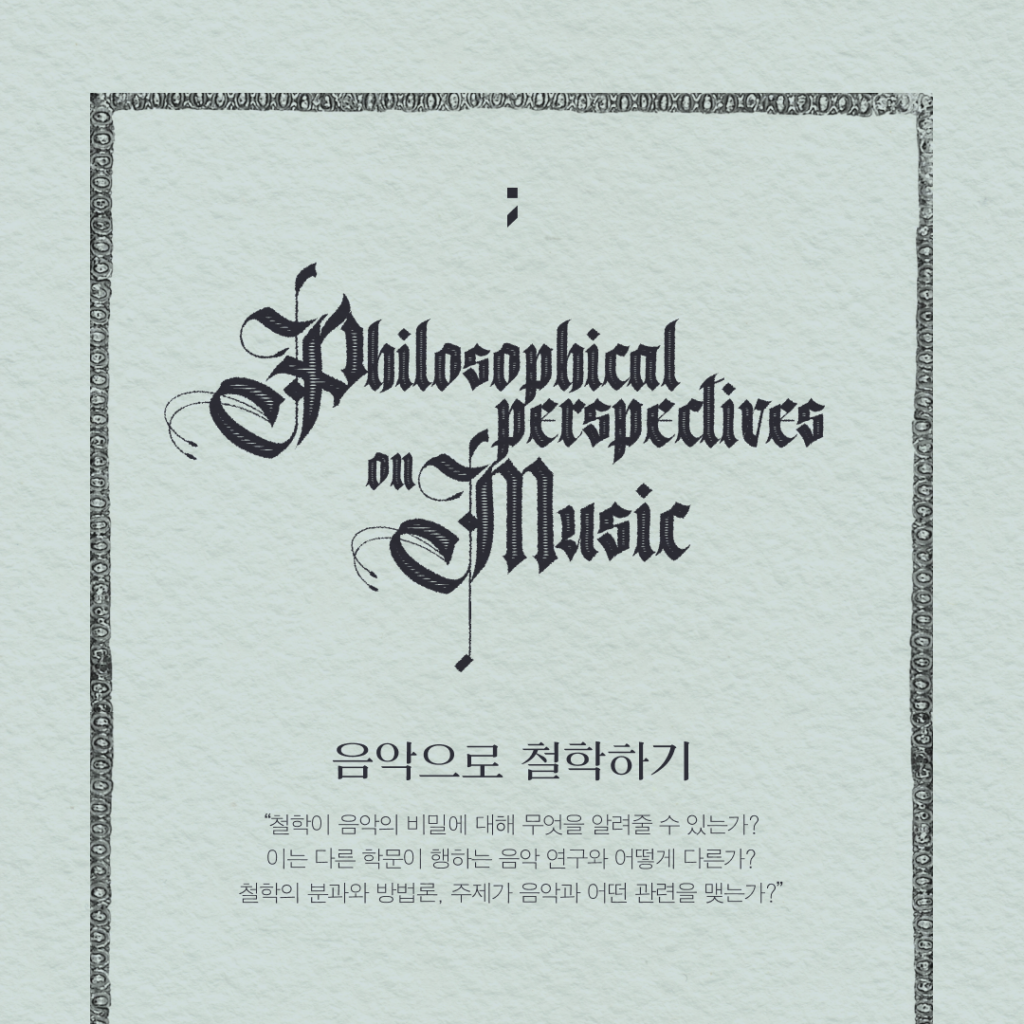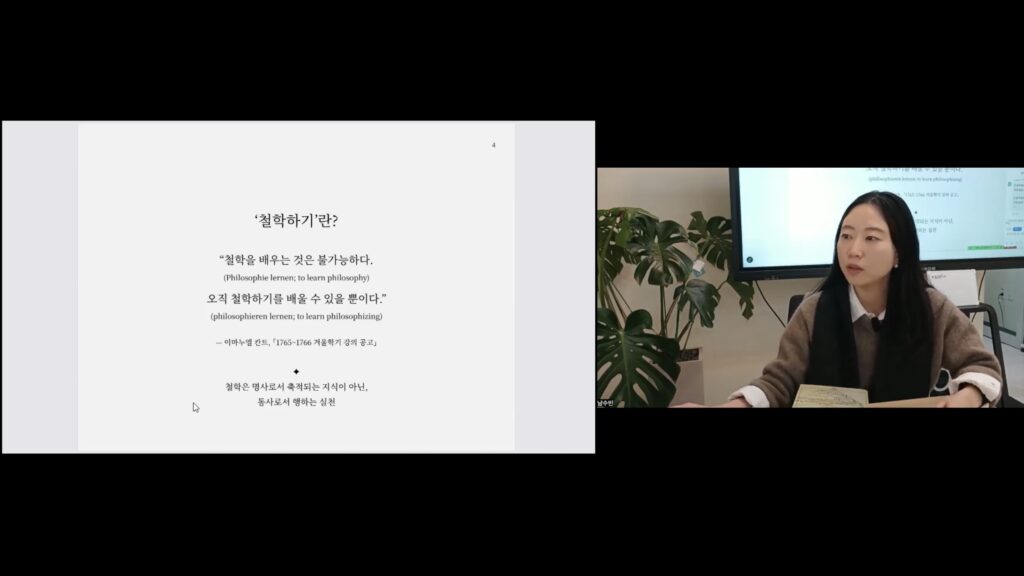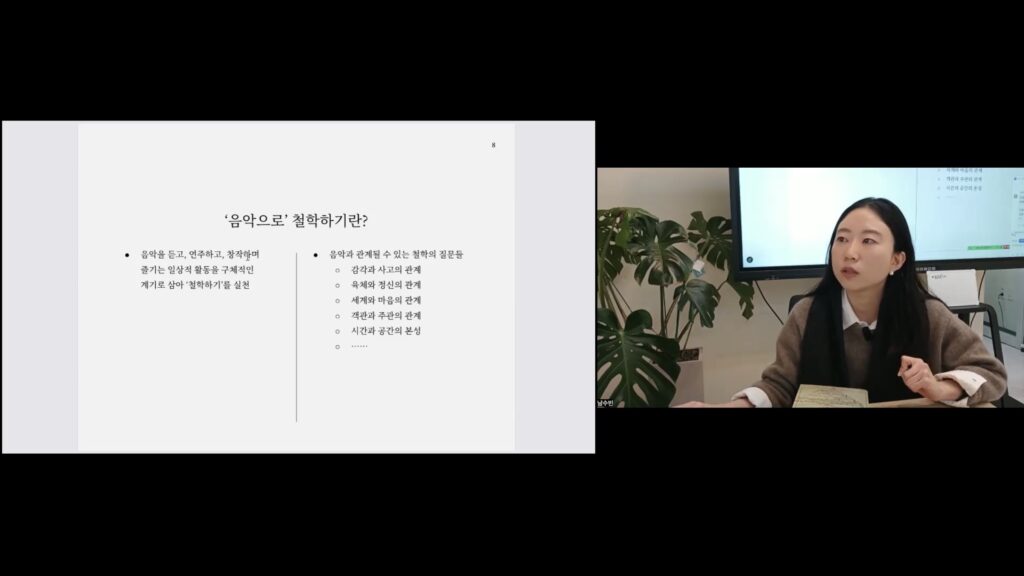- Dates: February 5th – April 9th, 2025 / Every Wednesday / 10 weeks
- Location: Jidda, Seoul
- Jidda is a private institution for citizens, modeled after Collège de France.
- Instructor: Subin Nam

1. Lecture Description
What is musical beauty? Why does music captivate us so deeply, and what is its value? These are questions that resonate with those who listen to, perform, and create music. While poetry, novels, criticism, musicology, psychology, sociology, and even music itself have sought to answer these questions, philosophy—one of humanity’s oldest disciplines—has also long been engaged in this inquiry.
Intertwining with various areas of philosophy, these questions branch out into finer and more intricate paths: Why are musical experiences so intense, yet so resistant to explanation? How do these experiences differ from those offered by other art forms or from mere perceptual experiences? Is music simply entertainment, or can it be understood as an expression of intelligence? What relationship does music have with emotions and affections?
This lecture explores philosophical discussions on these themes, ranging from ancient to contemporary perspectives, and examines the significance and limitations of various arguments. Through this, we will broaden our understanding of the role music plays in our lives and gain a more accessible pathway into philosophy itself.
2. Format of the Lecture
This lecture is conducted at the level of a university general education course, and no prior specialized knowledge of Western classical music or philosophy is required. Materials based on the textbooks will be distributed before each session.
3. Targeted Audience
- Music lovers interested in exploring philosophical perspectives on music
- Anyone seeking to approach philosophy through music
4. Textbooks
- Primary Text
- Wayne D. Bowman, Philosophical Perspectives on Music (OUP, 1998)
- Secondary Text
- Peter Kivy, Music Alone: Philosophical Reflections on the Purely Musical Experience (Cornell University Press, 1990)
- Friedrich Nietzsche, The Birth of the Tragedy [프리드리히 니체, 김출곤·박술 옮김, 『비극의 탄생』(읻다, 2023)]
- Jacques Rancière, The Politics Of Aesthetics: The Distribution of the Sensible, trans. Gabriel Rockhill (Continuum, 2004)
5. Weekly Plan


Week 1: Music and Philosophy
What can philosophy inform of the mystery of music? How does philosophical inquiry differ from the study of music in other disciplines? What relationship do the fields, methodologies, and themes of philosophy have with music? These questions will guide us in mapping out the scope of this lecture.
Week 2: Music as Imitation
Ancient Greek philosophers such as Plato, Aristotle, and Pythagoras regarded music as an activity that imitates ideal values. They raised questions like: Is musical imitation merely a deceptive perceptual stimulus, or is it a divine path toward truth and the divine? This session examines the debates surrounding music in ancient and medieval philosophy.
Week 3: Music as Idea (1)
Early modern German philosophers such as Kant, Schiller and Hegel emphasized the mental aspect of music, investigating how music differs from other human mental activities like knowledge or morality, and what musical beauty reveals to us. This session delves into their arguments on the nature and value of music.
Week 4: Music as Idea (2)
Building on and challenging earlier discussions, Schopenhauer and Nietzsche propose that music provides the most profound insight and unity beyond the capabilities of reason, offering something unique among the arts. This session explores how music achieves this unparalleled power.
Week 5: Music as Autonomous Form (1)
This session explores formalism’s claim that the nature and value of music lie not in external truths but in its internal structure. Hanslick’s assertion that music neither provokes nor expresses emotions and Gurney’s view that music engages a unique cognitive faculty will be examined.
Week 6: Music as Autonomous Form (2)
Continuing with modern formalism, this session focuses on Meyer’s argument that music conveys specific modes of persistence and Kivy’s claim that music lacks semantic content, with its logic—akin to syntax—forming the basis of musical pleasure.
Week 7: Music as Symbol
This Session examines Langer’s and Goodman’s claims that musical experiences function as symbols shaping our interpretations of the world. These theories, which frame music as a cognitive activity grounded in sign and symbol, will be compared to earlier approaches.
Week 8: Music as Experienced
Phenomenology reserves the dichotomy of subject and object or mentality and materiality, emphasizing the lived experience of the body. This session explores how philosophers influenced by Merleau-Ponty’s phenomenological method approach musical experience.
Week 9: Music as Social and Political Power
This session examines Adorno’s argument that situates music within social experience and political influence, moving beyond theories focused solely on the mental and formal aspects of music. Rancière’s perspective, which reinterprets aesthetics as a form of politics that distributes the sensible, will also be discussed.
Week 10: Music as Pluralistic Field
Most previous discussions have centered on ‘high art’ music by European composers as ‘the most musical of musics.’ This session explores modern efforts to redefine the position of musical practices outside this norm, considering those historically marginalized as the ‘others’ of ‘pure music.’